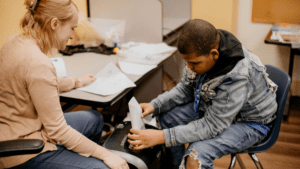
Seeded with support from the Child Health Association of Sewickley, what started as an idea for a senior project blossomed into a full-blown student-owned and operated business. Meet “Artism”, the […]
Stay up-to-date on the latest special education news and updates from the Watson Institute. We include news, as well as stories and helpful information featuring our special education teachers, therapists, and mental health professionals and how they provide exceptional educational and supportive services to children with special needs. Also learn about our special education school programs and outpatient resources for children ages 3 to 21.

Seeded with support from the Child Health Association of Sewickley, what started as an idea for a senior project blossomed into a full-blown student-owned and operated business. Meet “Artism”, the […]

As the seasons move closer to spring and warmer weather approaches, you may find your mind shifting to thoughts of summer. You might also be thinking about your summer employment […]

The Watson Institute’s Social Center for Academic Achievement (WISCA) program for autistic students incorporates transition services into the curriculum which aim to prepare students for adulthood. As part of this […]

Students at the Watson Institute begin preparing for adulthood early. Officially, transition curriculum starts at age 14, but activities and projects that help students develop the skills to succeed after […]

Watson’s peer mentoring program, which started in the WISCA autism school program, has now expanded to other Watson school programs! The Watson Institute’s special education school programs at our Bridgeville, […]

Special education assistive technology has paved the way for students with disabilities to expand the ways in which they learn and grow. At the Watson Institute’s Education Center South, eye […]

As a former community monitor in juvenile probation (JP), Marino Swanson brings a unique perspective to his role as a Classroom Therapist at Friendship Academy. In fact, he learned of […]

What is Makerspace? A Makerspace is a collaborative work space inside a school, library, or separate public/private facility for making, learning, exploring, and sharing that uses high-tech to no tech […]

At the Watson Institute, our special education teachers and staff work to adapt educational programming to best serve our students’ individualized needs. In the WISCA program, autistic students benefit from […]

The Watson Institute Social Center for Academic Achievement (WISCA) school program provides autistic students with educational, therapeutic, and behavioral support to help them succeed in and outside the classroom. As […]